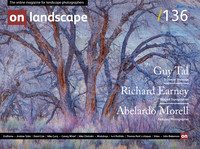
Thomas Peck’s Critiques
Colin Westgate’s rather lovely image Island in the Mist is right on the edge of that minimalist/abstract divide. There are perhaps two clear hooks that anchor the picture in reality. more

The Workshop Experience
I was finally booked onto a residential workshop, my first, with Thomas Joshua Cooper at Peter Goldfield's Duckspool in Somerset. I'm not sure who or what I was expecting. more

Warped Topographies
Maybe obsessiveness is the essential to 'art' and creativity. Art not only creates a reaction and provokes a response in the viewer but it can also reveal truths about oneself as the creator. more

Wild camping in The Shetland Isles
For anyone looking to photograph somewhere a bit more off the beaten track, The Shetlands offer up something different, and with the low number of tourists you can have the place to yourself for days on end. more

Andy Gray
Andy Gray has developed a technique which frequently uses exaggerated camera movements, and for which the recorded image is merely the starting point more

Why I love my iPhone for landscape photography
I think that the French painter and sculptor Jean Dubuffet (1901-1985) would approve of the iPhone in the making of art. Dubuffet eschewed traditional aesthetics in favour of what eventually became known as art brut, or outsider art. more

Thomas Peck’s Critiques
Living just next to Epping Forest I have always been fascinated by images of trees. They can be wonderfully expressive things. Not easy to photograph, though. Too chaotic, seemingly random, difficult to isolate from surroundings. more

Endframe: ‘Four trees, Rannoch Moor’ 1981 By Fay Godwin
When I received Charlotte's email asking me to consider writing an End Frame article for On Landscape a swirl of photographs immediately began to spin as if in a washing machine in my mind. more

A Long Ride South
Ten years ago, at a time where I had a Canon Eos and a passing interest in photography & a personal challenge to ride (horses not bikes!) from John O’ Groats to Lands End. more

Endframe: Upper Torridon, Winter Dawn by Joe Cornish
The midground provides a delicate connection between the upper and lower regions of the frame, with the two crops of land almost ‘reaching out’ to each other. more

Bye, Bye Landscape Photography, Dear
Sheer populousness is often a sign that something has peaked, and that its exciting, pioneering days are over. Given how varied the world is, and how different people are, I wondered: why do so many landscape photographs look exactly the same more

Thomas Peck’s Critiques
What does a diptych do? By bringing together two images the artist is implying a relationship between them. The viewer has to react to that relationship, to question it. more

Endframe: Postured Birches by Dav Thomas
Three years after the publication of Dav’s book With Trees, it’s still my go-to option when I have half an hour’s browsing time more

Chasing Pavements
Across the reserve there were areas of short cropped grasses and layers of limestone pavement. I’d been to limestone pavements in the Yorkshire Dales but this was unreal. more

Endframe: Winter Tees Mono V1F by Robert Fulton
This image was Winter Tees, and ironically, having seen Roberts work for several years and followed his many images from the Trossachs, I had never seen his Yellowstone collection. more

